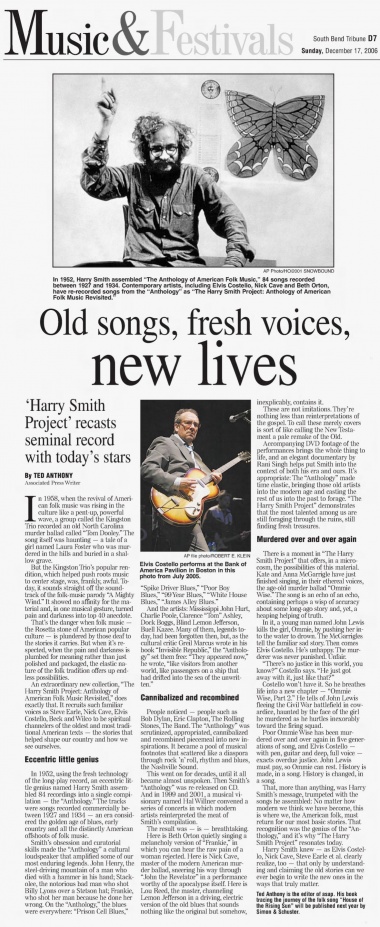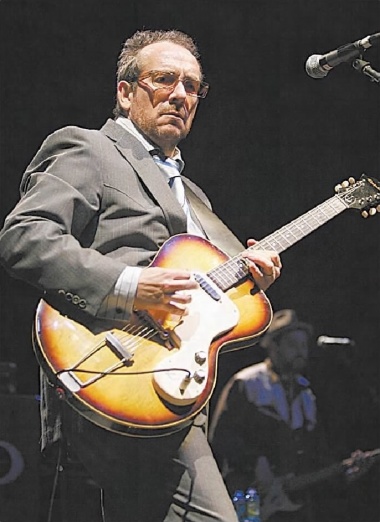South Bend Tribune, December 17, 2006: Difference between revisions
(start page) |
(formatting +uncorrected scanned text) |
||
| Line 6: | Line 6: | ||
{{Bibliography article header}} | {{Bibliography article header}} | ||
<center><h3> Old songs, fresh voices, new lives </h3></center> | <center><h3> Old songs, fresh voices, new lives </h3></center> | ||
<center> | <center>''' 'Harry Smith Project' recasts seminal record with today's stars </center> | ||
---- | ---- | ||
<center> Ted Anthony / Associated Press </center> | <center> Ted Anthony / Associated Press </center> | ||
---- | ---- | ||
'''In 1952, Harry Smith assembled The Anthology of American Folk Music, 84 songs recorded between 1927 and 1934. Contemporary artists, including Elvis Costello, Nick Cave and Beth Orton, have re-recorded songs from the Anthology as ''The Harry Smith Project: Anthology of American Folk Music Revisited''. | '''In 1952, Harry Smith assembled The Anthology of American Folk Music, 84 songs recorded between 1927 and 1934. Contemporary artists, including Elvis Costello, Nick Cave and Beth Orton, have re-recorded songs from the Anthology as ''The Harry Smith Project: Anthology of American Folk Music Revisited''. | ||
{{Bibliography text}} | {{Bibliography text 1}} | ||
In 1958, when the revival of Ameri-can folk music was rising in the culture like a pent-up, powerful wave, a group called the Kingston Trio recorded an old North Carolina murder ballad called "Tom Dooley." The song itself was haunting — a tale of a girl named Laura Foster who was mur-dered in the hills and buried in a shal-low grave. | |||
But the Kingston Trio's popular ren-dition, which helped push roots music to center stage, was, frankly, awful. To-day, it sounds straight off the sound-track of the folk-music parody "A Mighty Wind." It showed no affinity for the ma-terial and, m one musical gesture, turned pain and darkness into top 40 anecdote. | |||
That's the danger when folk music the Rosetta stone of American popular culture — is plundered by those deaf to the stories it carries. But when it's re-spected, when the pain and darkness is plumbed for meaning rather than just polished and packaged, the elastic na-ture of the folk tradition offers up end-less possibilities. | |||
An extraordinary new collection, "The Harry Smith Project: Anthology of American Folk Music Revisited," does exactly that. It recruits such familiar voices as Steve Earle, Nick Cave, Elvis Costello, Beck and Wilco to be spiritual channelers of the oldest and most tradi-tional American texts — the stories that helped shape our country and how we see ourselves. | |||
Eccentric little genius | |||
In 1952, using the fresh technology of the long-play record, an eccentric lit-tle genius named Harry Smith assem-bled 84 recordings into a single compi-lation — the 'Anthology." The tracks were songs recorded commercially be-tween 1927 and 1934 — an era consid-ered the golden age of blues, early country and all the distinctly American offshoots of folk music. | |||
Smith's obsession and curatorial skills made the "Anthology" a cultural loudspeaker that amphfied some of our most enduring legends. John Henry, the steel-driving mountain of a man who died with a hammer in his hand; Stack-olee, the notorious bad man who shot Billy Lyons over a Stetson hat, Frankie, who shot her man because he done her wrong. On the "Anthology," the blues were everywhere: "Prison Cell Blues," "Spike Driver Blues," "Poor Boy Blues," "99Year Blues," "White House Blues," "James Alley Blues." | |||
And the artists: Mississippi John Hurt, Charlie Poole, Clarence "Tom" Ashley, Dock Boggs, Blind Lemon Jefferson, Buell Kazee. Many of them, legends to-day, had been forgotten then, but, as the cultural critic Greil Marcus wrote in his book "Invisible Republic," the 'Antholo-gy" set them free: "They appeared now," he wrote, "like visitors from another world, like passengers on a ship that had drifted into the sea of the unwrit-ten." | |||
Cannibalized and recombined | |||
People noticed people such as Bob Dylan, Eric Clapton, The Rolling Stones, The Band. The "Anthology" was scrutinized, appropriated, cannibalized and recombined piecemeal into new in-spirations. It became a pool of musical footnotes that scattered like a diaspora through rock 'n' roll, rhythm and blues, the Nashville Sound. | |||
This went on for decades, until it all became almost unspoken. Then Smith's "Anthology" was re-released on CD. And in 1999 and 2001, a musical vi-sionary named HalWillner convened a series of conceits in which modern artists reinterpreted the meat of Smith's compilation. | |||
The result was is breathtaking. | |||
Here is Beth Orton quietly singing a melancholy version of "Frankie," in which you can hear the raw pain of a woman rejected. Here is Nick Cave, master of the modern American mur-der ballad, sneering his way through "John the Revelator" in a performance worthy of the apocalypse itself. Here is Lou Reed, the master, channeling Lemon Jefferson in a driving, electric version of the old blues that sounds nothing like the original but somehow, inexplicably, contains it. | |||
These are not imitations. They're nothing less than reinterpretations of the gospel. To call these merely covers is sort of like calling the New Testa-ment a pale remake of the Old. | |||
Accompanying DVD footage of the performances brings the whole thing to life, and an elegant documentary by Rani Singh helps put Smith into the context of both his era and ours. It's appropriate: The "Anthology" made time elastic, bringing those old artists into the modern age and casting the rest of us into the past to forage. "The Harry Smith Project" demonstrates that the most talented among us are still foraging through the ruins, still finding fresh treasures. | |||
Murdered over and over again | |||
There is a moment in "The Harry Smith Project" that offers, in a micro-cosm, the possibilities of this material. Kate and Anna McGarrigle have just finished singing, in their ethereal voices, the age-old murder ballad "Ommie Wise." The song is an echo of an echo, containing perhaps a wisp of accuracy about some long-ago story and, yet, a heaping helping of truth. | |||
In it, a young man named John Lewis kills the girl, Ommie, by pushing her in-to the water to drown. The McGarrigles tell the familiar sad story. Then comes Elvis Costello. He's unhappy. The mur-derer was never punished. Unfair. | |||
"There's no justice in this world, you know?" Costello says. "He just got away with it, just like that?" | |||
Costello won't have it. So he breathes life into a new chapter — "Ommie Wise, Part 2." He tells of John Lewis fleeing the Civil War battlefield in cow-ardice, haunted by the face of the girl he murdered as he hurtles inexorably toward the firing squad. | |||
Poor Ommie Wise has been mur-dered over and over again in five gener-ations of song, and Elvis Costello with pen, guitar and deep, full voice exacts overdue justice. John Lewis must pay, so Ommie can rest. History is made, in a song. History is changed, in a song. | |||
That, more than anything, was Harry Smith's message, trumpeted with the songs he assembled: No matter how modern we think we have become, this is where we, the American folk, must return for our most basic stories. That recognition was the genius of the "An-thology," and it's why "The Harry Smith Project" resonates today. | |||
Harry Smith knew as Elvis Costel-lo, Nick Cave, Steve Earle et al clearly realize, too — that only by understand-ing and claiming the old stories can we ever begin to write the new ones in the ways that truly matter. | |||
{{cx}} | {{cx}} | ||
'''Ted Anthony is the editor of asap. His book tracing the journey of the folk song ''House of the Rising Sun'' will be published next year by Simon & Schuster. | |||
{{Bibliography notes header}} | {{Bibliography notes header}} | ||
Revision as of 15:39, 26 October 2019
|


